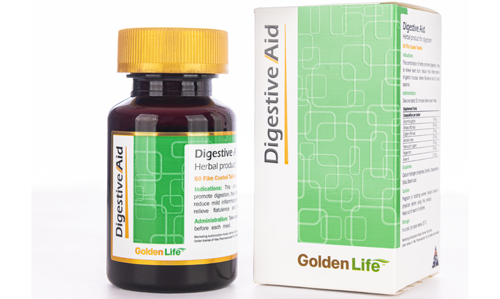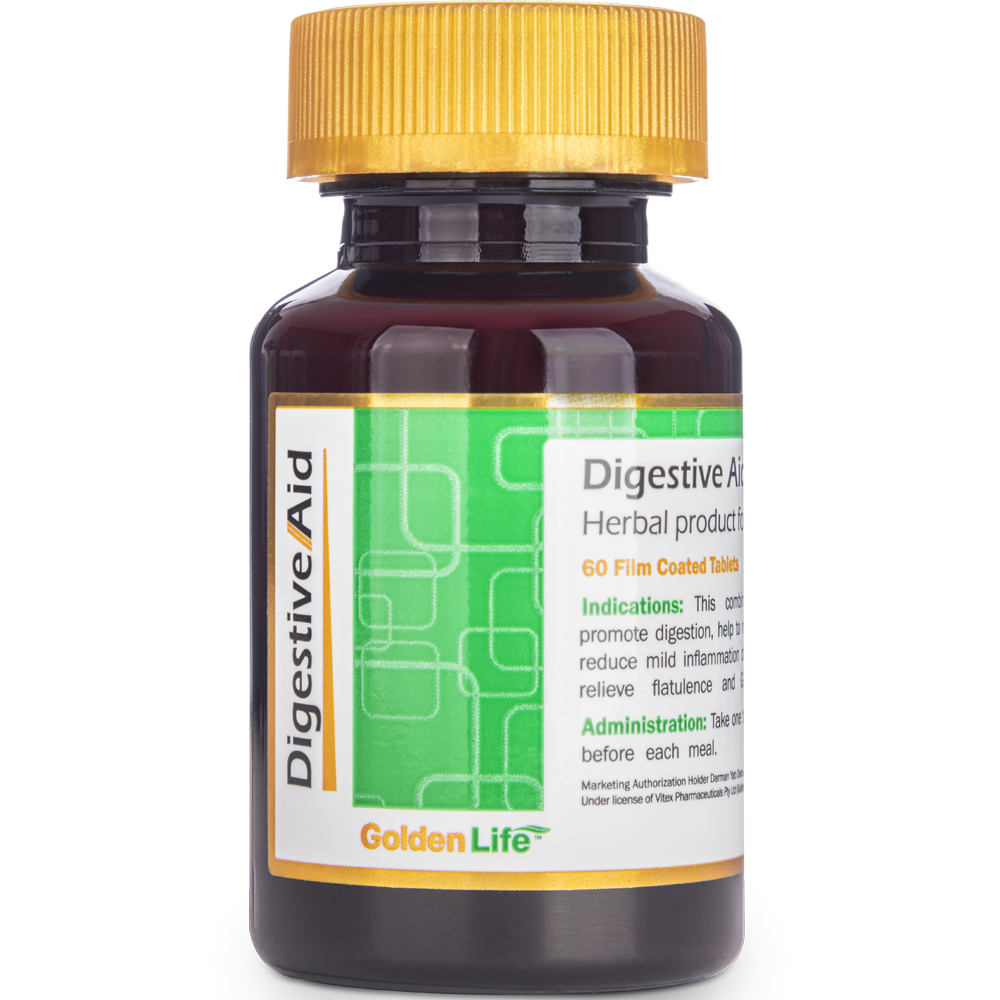Golden Life
Digestive Aid


RDA = Recommended Daily Allowance
UL= Upper limit
| UL | RDA (%) | Amount Per Serving | Ingredients |
| * | * | 50 mg | Glycyrrhiza Glabra extract |
| * | * | 200 mg | Althaea officinalis extract |
| * | * | 25 mg | Zingiber officinale extract |
| * | * | 125 mg | Gentiana lutea extract |
| * | * | 50 mg | Foeniculum Vulgare extract |
| * | * | 50 mcg | Mentha piperita extract |
| * | * | 0.2 mcg | Pimpinella Anisum extract |
- Stimulates digestion and relieves dyspepsia
- Improves absorption of nutrients
- Stimulates the secretion of bile and digestive enzymes
- Soothes mild inflammation of mucosa and helps relieve IBS
- Relieves cramps and flatulence
- Elimination of bad breath
Glycyrrhiza glabra (L.)
Common Name: Licorice
Licorice root contains glycoside glycyrrhizin, has been used as a pharmacological agent in the management of peptic ulcers. Licorice root is used for GI complaints like peptic ulcers, dyspepsia, colic, and chronic gastritis. There is some evidence that licorice might accelerate the healing of peptic ulcer. It appears to block metabolism of prostaglandins E and F2-alpha which suggest a possible beneficial effect on peptic ulcer. It has also antispasmodic, anti-inflammatory and laxative effect.
Althaea offcinalis
Common Name: Marshmallow
Both the root and leaves contain mucilage polysaccharides that can protect stomach mucosa membrane from local irritation by forming protective layer and help soothe mild inflammation. Recent studies confirmed its efficacy in inflammatory bowel diseases such as Crohn’s disease and ulcerative colitis. Marshmallow leaf and root are used for inflammation of the gastric mucosa, dyspepsia, peptic ulcers and constipation.
Foeniculum vulgare
Common Name: Fennel
Fennel dried ripe seeds and oil are used to make medicine. Fennel is used for various digestive problems including dyspepsia, flatulence, bloating, loss of appetite, and colic in infants.
Gentiana Lutea
Common Name: Gentian
The dried gentian root contains gentisin and gentiamarin, bitter glucosides. Gentian is used for digestion problems such as loss of appetite, fullness, dyspepsia, intestinal gas, diarrhea, gastritis and vomiting.
Pimpinella anisum
Common Name: Anise
Anise is an aromatic plant, important compounds of anise essential oil have stimulant and carminative properties make it useful in flatulency and colic.
Mentha piperita
Common Name: Pepermint
The applicable part of peppermint is the parts which have oil. The oil is a complex of menthyl ester, limonene, pinene, phellandrene and cadinene.
Peppermint is used for digestive problems including dyspepsia, indigestion, nausea, irritable bowel syndrome (IBS), diarrhea, cramps of the upper gastrointestinal (GI) tract and gas.
Zingiber offcinale
Common Name: Ginger
The rhizome and root of ginger are used as a spice and also as a medicine. Ginger contains active constituents known as gingerol, gingerdione and shogaol.
Ginger is commonly used to treat various types of stomach problems, including dyspepsia, morning sickness, colic, upset stomach, flatulence, diarrhea, nausea and loss of appetite. It also acts as a digestive stimulant.
Oral, take one tablet daily 30 min before each meal.
Contraindications:
No contraindications have been reported to date.
Glycyrrhiza glabra: People who have hypertension, lung edema and arrhythmia should consult a physician before use.
Pregnancy/Lactation:
This product is safe to use by pregnant or lactating women. Pregnant or lactating women should consult a physician before use.
Possible Side Effects:
No adverse effects have been reported to date.
Glycyrrhiza glabra: Hypokalemia, hypomagnesaemia, hypertension, headache, arrhythmia and water retention.
Foeniculum vulgare: It may cause nausea, seizures and lung edema.
Pimpinella anisum: It may cause allergic reactions in skin, respiratory and digestive system.
Gentiana lutea: It may cause nausea or vomiting.
Mentha piperita: Use of undiluted peppermint oil can cause allergic reaction.
Zingiber offcinale : Heartburn may occur.
Possible interaction:
No interaction with other medicinal products has been reported to date.
Glycyrrhiza glabra: Concomitant use of nitrofurantoin with glycyrrhiza glabra makes more of the drug excreted in urine.
Althaea offcinalis: It coats the lining of the stomach so it may interfere with the absorption of other drugs or herbs. Its better be taken one hour before or after other medicine.
Zingiber offcinale: If you are taking warfarin, inform your physician. Concomitant use of ginger with warfarin increases the bleeding time. Also concomitant use of aspirin with ginger is not recommended.